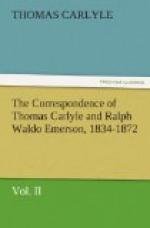--------- * Portions of this and of the following letter of Emerson have been printed by Mr. Alexander Ireland in his “Ralph Waldo Emerson: Recollections of his Visits to England,” &c. London, 1882. ----------
But the manner of it!—the author sitting as Demiurgus, trotting out his manikins, coaxing and bantering them, amused with their good performance, patting them on the back, and rating the naughty dolls when they misbehave; and communicating his mind ever in measure, just as much as the young public can understand; hinting the future, when it would be useful; recalling now and then illustrative antecedents of the actor, impressing, the reader that he is in possession of the entire history centrally seen, that his investigation has been exhaustive, and that he descends too on the petty plot of Prussia from higher and cosmical surveys. Better I like the sound sense and the absolute independence of the tone, which may put kings in fear. And, as the reader shares, according to his intelligence, the haughty coup d’oeil of this genius, and shares it with delight, I recommend to all governors, English, French, Austrian, and other, to double their guards, and look carefully to the censorship of the press. I find, as ever in your books, that one man has deserved well of mankind for restoring the Scholar’s profession to its highest use and dignity.* I find also that you are very wilful, and have made a covenant with your eyes that they shall not see anything you do not wish they should. But I was heartily glad to read somewhere that your book was nearly finished in the manuscript, for I could wish you to sit and taste your fame, if that were not contrary to law of Olympus. My joints ache to think of your rugged labor. Now that you have conquered to yourself such a huge kingdom among men, can you not give yourself breath, and chat a little, an Emeritus in the eternal university, and write a gossiping letter to an old American friend or so? Alas, I own that I have no right to say this last,—I who write never.
-------- * As long before as 1843 Emerson wrote in his Diary: “Carlyle in his new book” (Past and Present), “as everywhere, is a continuer of the great line of scholars in the world, of Horace, Varro, Pliny, Erasmus, Scaliger, Milton, and well sustains their office in ample credit and honor.” ---------
Here we read no books. The war is our sole and doleful instructor. All our bright young men go into it, to be misused and sacrificed hitherto




